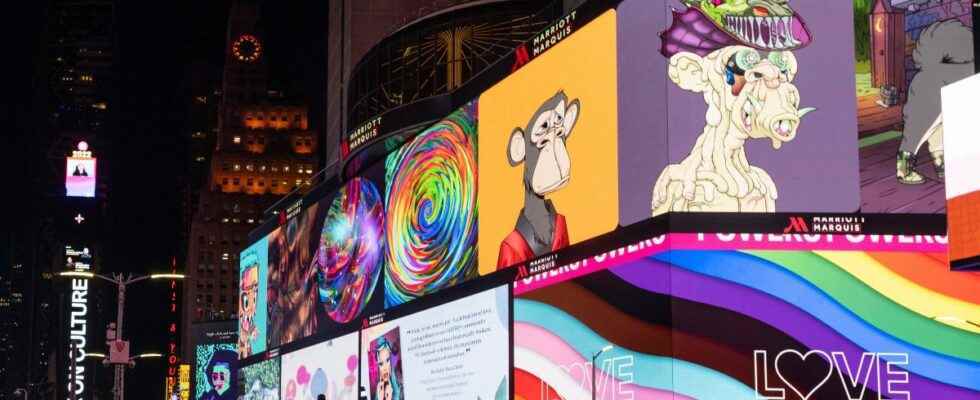4
According to a study by Galaxy, NFT followers do not actually hold the virtual item they think they are acquiring. And for good reason, “many transmitters, including the largest, Yuga Labs, seem [les] have misled”.
After the spectacular breakthrough of NFTs in 2021, it is time for questions as this market is currently going through a difficult period, in the wake of the collapse of cryptocurrencies. While many stars (Jimmy Fallon, Stephen Curry, Shaquille O’Neal, Neymar, Omar Sy, Snoop Dogg, etc.) have not hesitated to put their hands in their wallets to buy NFTs, the craze for these digital assets gave way to great doubts. One in particular assails buyers: are they the true owners of their NFTs?
According to a study by Galaxy, an investment company specializing in blockchain technologies, the answer is rather negative. In reality, the buyers would not hold much, victims of a still very vague legal framework, authorizing not to grant real property rights. “Many issuers, including the largest, Yuga Labs, appear to have misled NFT buyers as to the intellectual property rights of the content they sell”, reveals the study. Therefore, “the vast majority of NFTs do not convey any intellectual property rights over their underlying content”says Galaxy.
NFT issuers are the true owners
This worrying observation seriously damages the image of a sector in which companies that want to profit from it rely on the fact that NFTs are unique and unforgeable digital objects. But if the person doesn’t really have a piece of digital art, he has no interest in spending thousands of dollars to afford it. Who can imagine paying for a Van Gogh painting that can be taken back to their living room at any time by the seller? Nobody…
Yet this is what is currently happening in the NFT market. “Most people talk about buying NFTs like buying jpegs, the image files you see online in avatars and marketplaces like OpenSea. But the reality is that the issuers of the NFT collections retain full ownership of these imagessums up the Galaxy study. The mere fact that an NFT points to a certain image does not give the owner of that NFT any rights to the image, any more than creating a Mona Lisa NFT gives its creator rights to the work.”
Opaque contracts to mislead buyers
Galaxy thus recalls the actual conditions of detention of an NFT. Beyond an NFT pointing to a specific image, “something more is needed, and that something is a legal agreement between the owner of the image — known as the copyright holder — and the NFT holder specifying the rights the latter has in relation to the image. To the extent that an NFT buyer has rights to the image associated with their NFT, these do not arise from their ownership of the token, but from the terms and conditions contained in the license issued by the NFT project governing the purchase and sale of the token. ‘use of the image by the holder of the NFT’explains the study.
In the case of Yuga Labs, the industry behemoth behind the famous collection Bored Ape Yacht Club valued at more than $4 billion, the company and the buyer are bound by a simple license agreement, while the contracts ensure that the holder of the NFT “completely owns” the image. A lie that makes it impossible for the acquirer to use their NFT as they see fit, to create derivative products for example.
The picture is even more complex in the case of a purchase on marketplaces like OpenSea. Indeed, the buyer is then no longer only bound to a contract with the issuer of the NFT; he also enters into a contract with the platform that sold him the virtual object, which has its own terms of use. Enough to mislead the holders of NFTs a little more… To regain their trust, NFT players will therefore have to comply with an exercise in transparency and get out of this artistic vagueness, under penalty of being considered as crooks.
